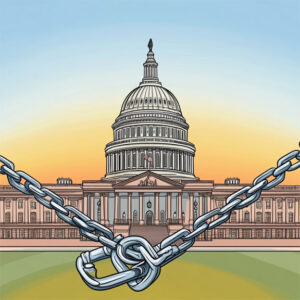 Prior to Trump’s first victory mainstream Republicans attacked and criticized. His victory not only silenced almost all his conservative critics most became fawning Trump loyalists. Lindsey Graham provides an excellent example of Trump’s transformative power: he was polymorphed from a savage attacker to Trump’s attack dog. Few dared oppose him during his first term, such as John McCain and Mitt Romney. But the Republicans in congress now act in accord with his will and whims. There are a few surviving conservative critics of Trump, but they have proven politically irrelevant. This does make sense, as Trump is the logical result of decades of GOP strategies and efforts. If the Republican party were a Pokemon, Trump would be the final evolution of the party.
Prior to Trump’s first victory mainstream Republicans attacked and criticized. His victory not only silenced almost all his conservative critics most became fawning Trump loyalists. Lindsey Graham provides an excellent example of Trump’s transformative power: he was polymorphed from a savage attacker to Trump’s attack dog. Few dared oppose him during his first term, such as John McCain and Mitt Romney. But the Republicans in congress now act in accord with his will and whims. There are a few surviving conservative critics of Trump, but they have proven politically irrelevant. This does make sense, as Trump is the logical result of decades of GOP strategies and efforts. If the Republican party were a Pokemon, Trump would be the final evolution of the party.
The surrender and assimilation of the Republican leadership was not surprising; the party focused on winning and holding power rather than developing and advancing meaningful policy goals. Whatever ideology once defined the party has become a devotion to power for the sake of power and profit. Under Trump, all talk of a balanced budget, all worries about deficits and have ceased. What is more interesting is the impact Trump has had on his followers.
When Joe Walsh made a futile effort to challenge Trump for the Republican nomination. During his effort, he asked Trump supporters if Trump has every lied. They said that he had not. Walsh brought up Trump’s criticism of Obama playing golf and Trump’s claim that he would be too busy as president to play golf. While most people did not care about, some insisted Trump had never played golf as president. His supporters also believed that hundreds of miles of the wall had been built and paid for by Mexico and that the Democrats in congress are treasonous liars. Walsh closed by noting that he “…realized once and for all that nobody can beat Trump in a Republican primary. Not just because it’s become his party, but because it has become a cult, and he’s a cult leader. He doesn’t have supporters; he has followers. And in their eyes, he can do no wrong.” This raised some interesting philosophical concerns.
Some might respond by saying “what about the Democrats?” and accuse them of being a cult. While one could debate political cults, this “what about” would (as always) be irrelevant. Even if the Democrats were a cult, this would prove or disprove nothing about Republicans. My concern is with looking at the epistemology and thinking of the voters Walsh encountered.
One possible explanation is that Trump voters have normal epistemic abilities and hold to true beliefs but are lying in this case. They believe that Trump lies, that the wall was not paid for by Mexico and so on. People often lie in support of people they like, especially when they think those people are being attacked. This is a matter of ethics: believing that it is right to lie in defense of someone you support especially when speaking their opponent. While subject to moral assessment, this need not be cultish. After all, people will lie to defend their friends.
A second explanation is that these voters’ epistemic abilities and critical thinking skills have always been defective and they are unusually bad at forming true beliefs and critically assessing claims. This could be due to various biases and the usual reasons people fall victim to fallacies and rhetoric. But this need not be cultish since believing false things because of epistemic defects or failures in critical thinking is a common occurrence. On this explanation, Trump supporters are wrong, but they are not wrong because of being cultists. Rather, they are following Trump because they are wrong.
A third explanation is that these voters’ epistemic abilities and critical thinking skills have been corrupted by Trump’s influence. That is, they reject the rational methods of forming beliefs and critical thinking in favor of believing in Trump because Trump tells them to believe in him. They are wrong because they are following Trump. In this case, they might be cultists. They would be accepting a “Trump command theory” in what Trump says is true is true because Trump says so and what Trump says is false because Trump says so. If this explanation is correct, Trump is shaping the perceived reality of his followers. They are not lying to defend him or themselves, they are true believers in Trump’s false description of the world. That is, they are a cult with a charismatic leader.

 James J. LaBossiere, born on December 19, 1939, in Norway, Maine, was the son of Alfred “Cooper” and Gladys Clement LaBossiere. He passed away peacefully on May 3, 2025, leaving behind an enduring legacy as a father and a teacher.
James J. LaBossiere, born on December 19, 1939, in Norway, Maine, was the son of Alfred “Cooper” and Gladys Clement LaBossiere. He passed away peacefully on May 3, 2025, leaving behind an enduring legacy as a father and a teacher. Ever since Trump won his first term in office, I have wondered why people support him. I am not going make a straw man his supporters and say they are all stupid, racist, or opportunists. Rather, I want to consider reasons why people back Trump.
Ever since Trump won his first term in office, I have wondered why people support him. I am not going make a straw man his supporters and say they are all stupid, racist, or opportunists. Rather, I want to consider reasons why people back Trump. As a political tool, members of congress threaten or engage in a government shutdown. When the government is shut down, federal workers can be furloughed and sent home without pay and forbidden from working. Others, like TSA agents, can be compelled to work without pay. As the government shutdown does not shut down bills and expenses, the unpaid workers will be harmed by their lack of income. While some federal workers are well paid, many live from paycheck to paycheck and have few financial reserves. Because of this, some federal workers have turned to food banks during past shutdowns. In addition to the impact on workers, there are indirect impacts on those providing goods and services. After all, people who are not getting paid will be spending less.
As a political tool, members of congress threaten or engage in a government shutdown. When the government is shut down, federal workers can be furloughed and sent home without pay and forbidden from working. Others, like TSA agents, can be compelled to work without pay. As the government shutdown does not shut down bills and expenses, the unpaid workers will be harmed by their lack of income. While some federal workers are well paid, many live from paycheck to paycheck and have few financial reserves. Because of this, some federal workers have turned to food banks during past shutdowns. In addition to the impact on workers, there are indirect impacts on those providing goods and services. After all, people who are not getting paid will be spending less. The denotation of a word is what it literally means. The connotation is the emotional loading of the word, which can be negative or positive; this is how the word makes you feel. To illustrate, “swarm” and “infestation” have strong negative connotations. Whether the connotation is negative or positive depends on various factors, such as how the audience feels about the word. For example, the connotation of “socialism” is negative for most Americans but obviously positive to socialists. Two words can have the same denotation, but very different connotations. For example, the slang “pig” and the word “police” have the same denotation, but different connotations. As would be expected, rhetoric uses the influence of connotation to affect how people feel.
The denotation of a word is what it literally means. The connotation is the emotional loading of the word, which can be negative or positive; this is how the word makes you feel. To illustrate, “swarm” and “infestation” have strong negative connotations. Whether the connotation is negative or positive depends on various factors, such as how the audience feels about the word. For example, the connotation of “socialism” is negative for most Americans but obviously positive to socialists. Two words can have the same denotation, but very different connotations. For example, the slang “pig” and the word “police” have the same denotation, but different connotations. As would be expected, rhetoric uses the influence of connotation to affect how people feel. During Trump’s first term the United States
During Trump’s first term the United States  While the term “fascism” has been around since before WWII, its use has surged in recent years and is used across the American political spectrum. Both Bush and Obama were called fascists. Trump’s detractors and supporters regularly use the term on each other. But what is fascism?
While the term “fascism” has been around since before WWII, its use has surged in recent years and is used across the American political spectrum. Both Bush and Obama were called fascists. Trump’s detractors and supporters regularly use the term on each other. But what is fascism? Since most Americans find overt racism unpalatable, racist politicians and pragmatic exploiters of racism need to avoid it. However, they want to recruit and advance their agenda, so they need to express their racism while maintaining plausible deniability. The example I will focus on involves racism and migration.
Since most Americans find overt racism unpalatable, racist politicians and pragmatic exploiters of racism need to avoid it. However, they want to recruit and advance their agenda, so they need to express their racism while maintaining plausible deniability. The example I will focus on involves racism and migration. I will begin with the obvious: charity is good and those who help others from the goodness of their hearts are good people. But behind the light of charity lies a terrible darkness. This darkness remains unseen, for attention is focused on the light.
I will begin with the obvious: charity is good and those who help others from the goodness of their hearts are good people. But behind the light of charity lies a terrible darkness. This darkness remains unseen, for attention is focused on the light. Some claim that “wokeness” (formerly “political correctness) has gone too far so that “you can’t say anything anymore.” As evidence people often offer examples of celebrities who faced some consequences for saying things that seem racist, homophobic or sexist. They also point to trigger warnings, safe spaces and when right wing speakers have been harassed or silenced.
Some claim that “wokeness” (formerly “political correctness) has gone too far so that “you can’t say anything anymore.” As evidence people often offer examples of celebrities who faced some consequences for saying things that seem racist, homophobic or sexist. They also point to trigger warnings, safe spaces and when right wing speakers have been harassed or silenced.